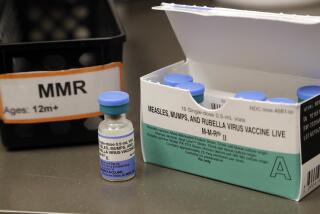On the Internet, anyone can speak persuasively about vaccines
Can measles really kill you? Is the vaccine more dangerous than the disease?
People seeking answers to questions like these often search for them online. And when they do, they can be strongly influenced by the information they find there – even when it comes from some surprising sources, a new study suggests.
When presented with mock public service announcements from the Centers for Disease Control and Prevention or the National Vaccine Information Center, study volunteers found the information persuasive. But they also welcomed advice from fake commenters, researchers found.
“We were quite surprised by the results,” said study lead author Ioannis Kareklas, a professor of marketing at Washington State University’s Carson College of Business. “Given that the CDC’s recommendations are based on scientific evidence, and the CDC’s mission is to protect individuals, we expected the PSAs to be more impactful than the online comments from presumably non-experts.”
Nearly 3 in 4 Internet users look for health information online, according to a 2012 survey by the Pew Research Center. Much of that information comes from official sources like the CDC, the National Institutes of Health and the American Academy of Pediatrics. (All three endorse the vaccination schedule recommended by the Advisory Committee on Immunization Practices.)
But visitors to health websites have a lot to share as well.
Kareklas and his WSU colleagues – fellow marketing professor Darrel Muehling and graduate student T.J. Weber – wondered whether those comments have any effect on readers. So they conducted a series of experiments to find out.
First, they designed a pair of public service announcements featuring a photo of a tiny sleeping baby. In one version, the PSA was headlined, “Save a Life: Vaccinate.” Underneath was a CDC logo and the following text: “Vaccines have significantly decreased the occurrence of life-threatinging diseases, including polio, measles, and pertussis (whooping cough). By choosing to vaccinate, you may be saving a life.”
In the other version, titled, “Save a Life: Don’t Vaccinate,” readers were warned that “vaccines have significantly increased the occurrence of life-threatening diseases, medication-resistant seizures and mental retardation. By choosing not to vaccinate, you may be saving a life.” The logo for the National Vaccine Information Center appeared in one corner.
[The nonprofit NVIC says it “does not advocate for or against the use of vaccines” and describes itself as a proponent of “vaccine safety and informed consent protections in the public health system.” However, its campaigns portray vaccines as risky and encourage people to consider alternatives, like hand-washing. In his book “Denialism: How Irrational Thinking Hinders Scientific Progress, Harms the Planet, and Threatens Our Lives,” Michael Specter calls the group “the most powerful anti-vaccine organization in America.”]
Study participants rated both groups as credible; in a 7-point test that measured characteristics like honesty, believability and truthfulness, the CDC earned an average score of 5.61 and the NVIC got a 4.96. And the more that study participants believed in an organizaton’s credibility, the more accepting they were of the views in their mock PSAs, the researchers found.
In another experiment, the same PSAs were followed by reaction from three fictitious commenters. One was supposedly a doctor with expertise in vaccines; one was a lobbyist who worked on healthcare issues; and the third was a college student majoring in English literature.
Study participants who thought the commenters were credible were particularly swayed by the (fictitious) doctor’s strong endorsement of vaccines, regardless of which PSA they saw. However, those who put little stock in the commenters’ authority were more persuaded by the (fictitious) lobbyist’s take that “vaccines are completely unsafe” and that “there is a proven link between vaccines and autism.” (For the record, there isn’t: The 1998 study that proposed such a link has been retracted by the journal that published it.)
The statements made by commenters helped determine whether a PSA was able to persuade people that vaccination was important and whether they would be sure to vaccinate themselves and their families. In some cases, the online comments made by strangers had a greater influence than the PSAs themselves, the researchers wrote.
The study was published online in the Journal of Advertising.
Kareklas said it was “quite disconcerting” to find that online comments from random people with no particular expertise were just as persuasive as advice from the CDC. But he said it was reassuring to see that people trusted the credible commenter with no financial conflicts of interest (the doctor) more than the less credible commenter with potential financial conflicts (the lobbyist).
None of this makes Kareklas think people should avoid the Internet as a source of valuable health information. But they shouldn’t simply trust everything they read online without evaluating the credibility of the source, he added.
The researchers also offered some practical advice to organizations that might try to persuade people with public service announcements.
“We don’t think that the CDC should take down comments from individuals who argue against vaccines,” he said. “Instead, we think they should ensure that pro-vaccine comments from vaccinology experts are easy to find and plentiful on their website.”
Follow me on Twitter @LATkarenkaplan and “like” Los Angeles Times Science & Health on Facebook.







